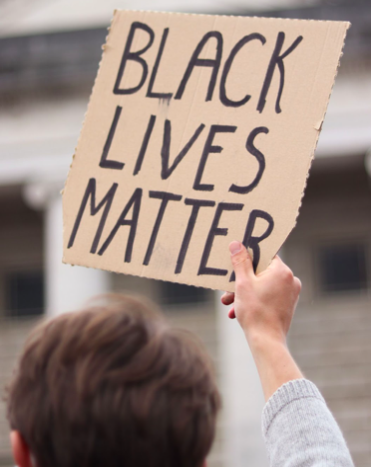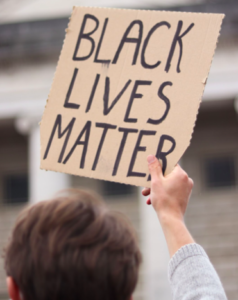In my new neighborhood in Raleigh, there are Black Lives Matter signs, but no Black people. At the end of the street, there is a magnet elementary school that I pass almost every day in my Black, queer, femme body on my walks with my dog — neither at drop off nor pick up, have I seen a Black student. I moved here sight unseen during the pandemic, and now I wonder daily if my white neighbors know that “Black Lives Matter” means giving up their segregated schools and zoned neighborhoods that do not need “white only” signs to keep Black people out.
Everyone is perfectly nice — they wave from their porches when I drive past to my job where, in part, I am responsible for summarizing legislation that, without question, will have a disproportionately harmful impact on Black people and other minoritized groups. In the last month, I have read and written about anti-abortion legislation, anti-riot legislation (a response to last year’s protests), and a bill that would ban teaching about racism and sexism. We generate talking points to humanize the people whom legislators discuss but don’t know, even as they make decisions that dictate the quality and lengths of their lives. Our wins are limited and mostly, we work to ensure things don’t get worse. Then, I get home and walk the dog in my white neighborhood.
In my former life as a professor, I would tell my students that white and Black neighborhoods, and the disparities we often witness between the two, are not natural — they were made and can be unmade. To do so requires a collective realization that fulfilling the summer of 2020’s calls for racial justice will require sacrifices.
A dear friend of mine described sacrifice as an act of faith, a trust that you are giving up something of value to receive more. When outlining environmental justice to my students and the global need to sacrifice — to give up fast fashion, instant gratification, the sense of entitlement to every fruit the planet can bear year round — she said “what is at stake in your willingness to sacrifice is our very survival.”
I think this holds true for the tiringly repetitive conversations about allyship that center the redemption of white souls rather than the Black people killed by police (including here in Elizabeth City, North Carolina), as well as Black trans women’s alarming vulnerability to homicide, the exposure to environmental hazards, the poor medical outcomes, the poor educational access, and more that Black people experience. white people will have to give up, among other things, the belief that proving their morality and wokeness is at stake in any effort to protect Black lives.
We are in a horrifying and repetitive ritual where sparks of outrage and public discourse fall flat against a backdrop of the white supremacist authoritarian impulses of the state to punish, detain, and kill. The outrage without concerted, radical action is akin to virtue signaling, just like Black Lives Matter signs in segregated neighborhoods.
What strikes me most about these routinized periods of white outrage and reflection is how quickly we latch onto the spoils without the sacrifice — we want the rainbows of Pride without the riots of Stonewall; we want Juneteenth off but not to teach the legacies that delayed and delay liberation for Black people and other minoritized groups; we want to sponsor the Black Lives Matter panel, but not to atone via reparations for legacies of subprime loans and other predatory practices on Black communities. Superficial demonstrations, while the mechanisms of white supremacy codify, legalize, and normalize violence against Black, Brown, Indigenous, Latinx, and Asian people, against the disabled, against LGBTQ people, against the poor, and compound against those whose identities are situated across axes of oppression.
“What are you willing to sacrifice?” is now the only acceptable starting point for conversations about anti-racism. Are you willing to give up the false sense of safety provided by the police? Are you willing to give up your money? Your comfort? Your advocacy for the devil? Your individualism? Your instant gratification? The relationship you have with “that family member who voted for Trump”? And once you have, will you graciously accept no praise for doing what was needed?
But of course, these questions don’t fit on a lawn sign.
 Tatiana McInnis, PhD (she | her or they | them) is an educator and writer new to North Carolina. In her free time, find her hiking, reading, tending to her tiny herb garden, or snuggling with her dog, Hurston.
Tatiana McInnis, PhD (she | her or they | them) is an educator and writer new to North Carolina. In her free time, find her hiking, reading, tending to her tiny herb garden, or snuggling with her dog, Hurston.


There are no comments
Add yours